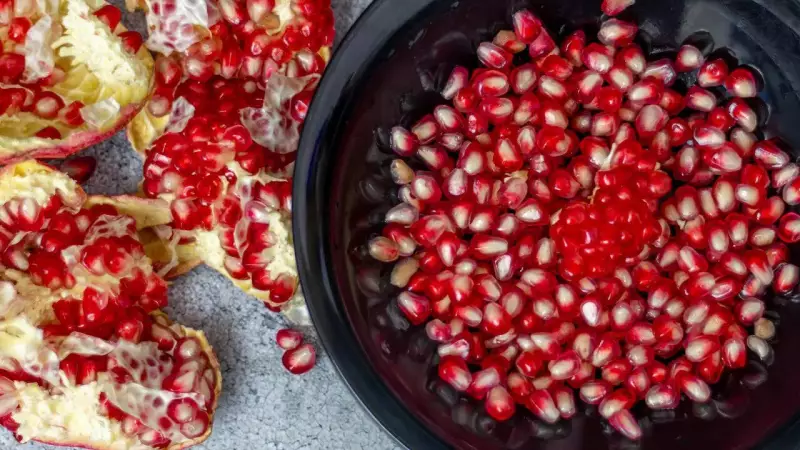
Pomegranates, with their glistening ruby-red seeds and perfect sweet-tart balance, are celebrated as one of nature's most powerful superfoods. Bursting with antioxidants, vitamin C, dietary fibre, and potassium, this fruit delivers impressive advantages for your heart, digestion, and immune defence. However, many enthusiasts inadvertently commit several blunders in their kitchen routine, which can strip away the fruit's vibrant flavour, texture, and nutritional power.
Common Pomegranate Handling Errors You Must Avoid
From the way you slice it open to how you store the leftovers, small missteps can have a big impact. Here are the seven most frequent mistakes people make with pomegranates and the smart ways to correct them for a superior experience.
Incorrect Cutting and Seed Extraction
Mistake 1: Cutting the fruit incorrectly
Slicing a pomegranate directly through its centre is a recipe for a messy kitchen and stained clothes. The force often causes the juice-filled arils to burst, wasting precious nectar. The professional technique is to lightly score the skin around the crown, gently pry the fruit apart into sections, and then tap the back with a spoon to release the seeds. For an even cleaner method, submerge the scored pieces in a bowl of water. The seeds will sink to the bottom, while the bitter white pith floats to the top, making separation effortless and your countertop spotless.
Mistake 2: Throwing away all the white pith
While the white, spongy membrane has a slightly bitter taste compared to the sweet seeds, it is completely edible and packed with its own set of nutrients. This pith is a good source of dietary fibre and contains valuable antioxidants. You don't need to eat it in large amounts, but instead of discarding it entirely, consider adding small pieces to your morning smoothie. This is an excellent way to reduce food waste and boost your nutrient intake simultaneously.
Safety and Consumption Oversights
Mistake 3: Skipping the wash
It's easy to assume that since we don't eat the skin, washing isn't necessary. This is a dangerous oversight. The tough outer rind can harbour dirt, bacteria, and traces of pesticides. When you cut into an unwashed pomegranate, your knife can transfer these contaminants from the surface to the edible seeds inside. Always make it a habit to rinse the fruit thoroughly under cool, running water and ensure your cutting board and knife are clean before you begin.
Mistake 4: Eating too many seeds at once
Pomegranate seeds are a health powerhouse, but moderation is key. Their high fibre content, while excellent for digestion, can cause bloating, gas, or stomach discomfort if consumed in large quantities in one sitting. For individuals monitoring their blood sugar, overindulgence might also lead to spikes. A sensible serving size is about a handful, which is roughly equivalent to half a cup of seeds.
Optimal Storage and Usage Techniques
Mistake 5: Storing them the wrong way
Proper storage is crucial for maintaining freshness. A whole pomegranate will stay fresh for about a week if kept at room temperature in a cool, dry spot. However, to significantly extend its life, refrigerate it where it can remain juicy and fresh for up to a month. Once you've extracted the seeds, transfer them to an airtight container and store them in the fridge for up to five days. For long-term storage, pomegranate seeds freeze exceptionally well, allowing you to enjoy their summery burst in smoothies or salads months later.
Mistake 6: Ignoring the juice pulp
When making fresh pomegranate juice at home, many people strain out all the pulp to get a clear liquid. In doing so, they discard a significant amount of fibre and nutrients trapped in that pulp. For a healthier and more wholesome juice, consider using a blender that retains the pulp, or only strain it partially. The leftover pulp can also be repurposed creatively in sauces, marinades, or chutneys, adding both nutrition and a unique texture.
Mistake 7: Overlooking possible medication interactions
This is a critical point that often goes unnoticed. Pomegranate juice, in particular, can interact with certain prescription medications. It may interfere with how your body processes some drugs, especially those for managing blood pressure and cholesterol (statins). If you are on any long-term medication, it is imperative to consult your doctor before making pomegranate juice a regular part of your diet.
Maximise Your Pomegranate Experience
By steering clear of these seven common errors, you can ensure that every pomegranate you buy delivers its full potential in taste, texture, and health-boosting properties. Proper handling preserves its rich antioxidant and vitamin content, while mindful consumption and strict food safety protect your well-being. Embrace these simple tips to truly honour this jewel of a fruit.
Disclaimer: This article is intended for informational purposes only and is not a substitute for professional medical advice. Please consult with a healthcare expert before making any significant changes to your diet, medication, or lifestyle.





